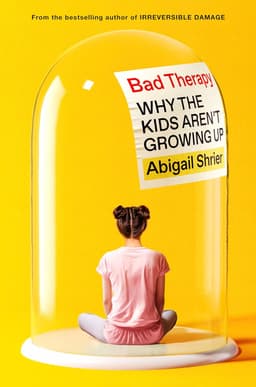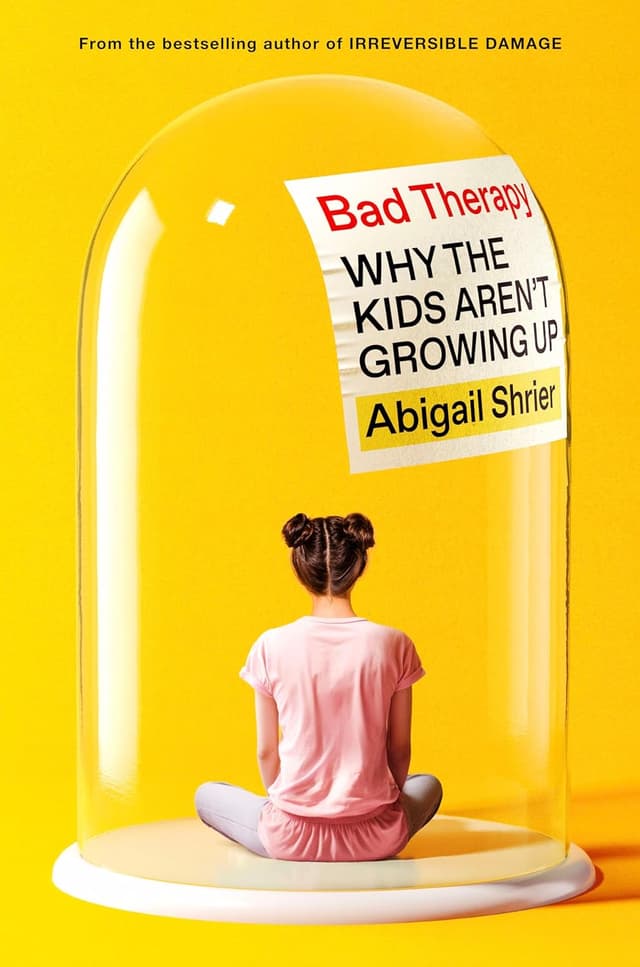
Bad Therapy by Abigail Shrier - 1 Minute Summary
Why the Kids Aren't Growing Up
Book by Abigail Shrier
Read the In-Depth 15 Minute Summary
"Bad Therapy" Reveals How Modern Therapeutic Culture is Failing Our Kids
In her thought-provoking book "Bad Therapy," journalist Abigail Shrier uncovers a disturbing trend: the very mental health establishment tasked with healing our children may actually be harming them. Shrier argues that the pervasive influence of therapy culture in schools, homes, and healthcare settings is inadvertently creating a generation of anxious, helpless, and fragile young people. By medicalizing normal childhood challenges and emotions, we're robbing kids of the opportunity to develop resilience and coping skills organically.
So what exactly is "bad therapy"? It's not just one thing, but rather a constellation of well-meaning but misguided practices that prioritize emotional validation over resilience-building. It's social-emotional learning curricula that encourage endless navel-gazing at the expense of academic rigor. It's the rush to diagnose and medicate every quirk or deviation from "normal." It's parenting advice that eschews discipline and boundaries in favor of constant affirmation. It's the "trauma-informed" dogma that presumes all kids are broken and need healing. Taken together, these trends create a feedback loop of learned helplessness and self-pathology.
The harm caused by this therapeutic overreach is significant and far-reaching. Kids marinate in the message that they're too fragile to handle life's inevitable challenges. They learn to see every setback as a mental health crisis requiring adult intervention. Immersed in a culture of victimhood and vulnerability, they become hypervigilant about potential triggers and traumas. Shrier shares heartbreaking stories of promising young people derailed by an identity built around brokenness. Robbed of agency and never given the chance to prove their own resilience, they sink into dysfunction and despair.
But there is hope. Shrier offers a roadmap for parents and educators who want to reject this toxic paradigm and raise capable, confident kids. The solution is not to deny children's struggles or withhold support, but rather to reframe challenges as opportunities for growth. Let them take risks and experience tolerable stress. Give them space to explore their identities without constant meddling. Set firm boundaries and expectations while communicating unconditional love. Encourage them to look outward and find meaning through contribution, not just endless self-exploration. Above all, have faith in their innate resilience.
The lessons of "Bad Therapy" extend beyond parenting. We all need to question the cultural narratives that equate vulnerability with virtue and suffering with self-knowledge. We need to resist the siren song of self-pity and remember that true fulfillment comes from overcoming adversity, not marinating in it. Most importantly, we need to reclaim our agency and recognize that no therapist or expert knows us better than we know ourselves. By rejecting the learned helplessness of therapy culture and embracing the challenges that forge character, we can all become more resilient - and help the next generation do the same.
Related Content


Bad Therapy Book Summary
Abigail Shrier
In "Bad Therapy," journalist Abigail Shrier argues that today's pervasive "therapeutic" culture and overzealous mental health interventions are harming young people by promoting learned helplessness, pathologizing normal emotions, and inhibiting the development of resilience.
In "Bad Therapy," journalist Abigail Shrier argues that today's pervasive "therapeutic" culture and overzealous mental health interventions are harming young people by promoting learned helplessness, pathologizing normal emotions, and inhibiting the development of resilience.
Therapy
Parenting
Psychology
Society

